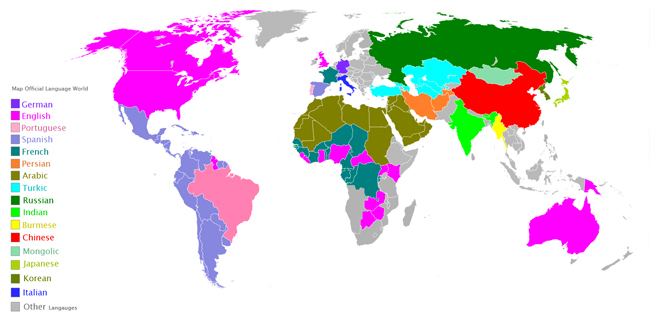
Source: Official languages map, SLFAW, Wikimedia
With so many languages in the world, have you ever wondered where English originated? Because English has so many multiple-meaning words, it is said to be one of the hardest languages to learn. One reason for this might be that English, considered mostly a Germanic language, is also heavily influenced by Latin-based or Romance languages like Spanish, French, and Italian. Even though English is said to be difficult to learn, knowledge of other languages can be helpful when trying to expand your English vocabulary.

Source: Flags, Max Klingensmith, Flickr
English has many cognates, or words from other languages that have similar spellings, pronunciations, and meanings. This means that if you know, or are studying, another language, you may recognize an English word simply because you know its cognate in the other language. Let's take, for example, the English word impossible. In Spanish and French, this word is spelled exactly the same, and in Italian, it is spelled impossibile. So, you know at least one word in four languages!
Let’s take a minute to look at a few cognates from other languages. There are many French-English cognates. The following are just a few:
| English | French |
|---|---|
| blond | blond |
| cruel | cruel |
| modern | moderne |
| bicycle | bicyclette |
| carrot | carotte |
| question | question |
| criminal | criminel |
| doctor | docteur |
| anniversary | anniversaire |
| ordinary | ordinaire |
| accident | accident |
| fruit | fruit |
| soup | soupe |
| apartment | appartement |
| tiger | tigre |
Now, take a look at a few German-English cognates. Note: All nouns in German are capitalized.
| English | German |
|---|---|
| alarm | Alarm |
| oval | Oval |
| alphabet | Alphabet |
| algebra | Algebra |
| auto | Auto |
| atlas | Atlas |
| frost | Frost |
| ball | Ball |
| garden | Garten |
| broccoli | Broccoli |
| milk | Milch |
| fat | fett |
In this lesson, you will focus on English and Spanish cognates. You will learn tips for identifying cognates and for using cognates to improve your vocabulary and reading skills.